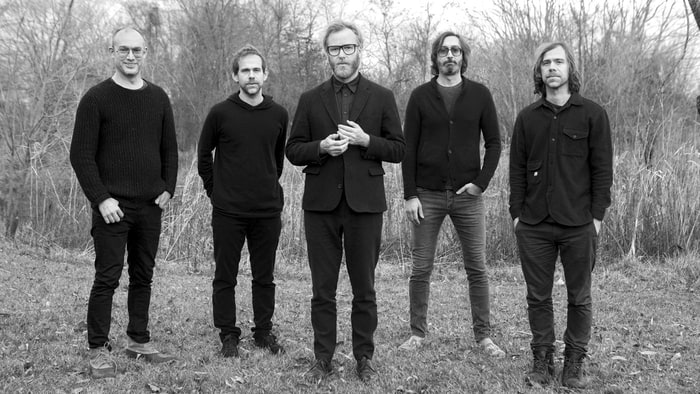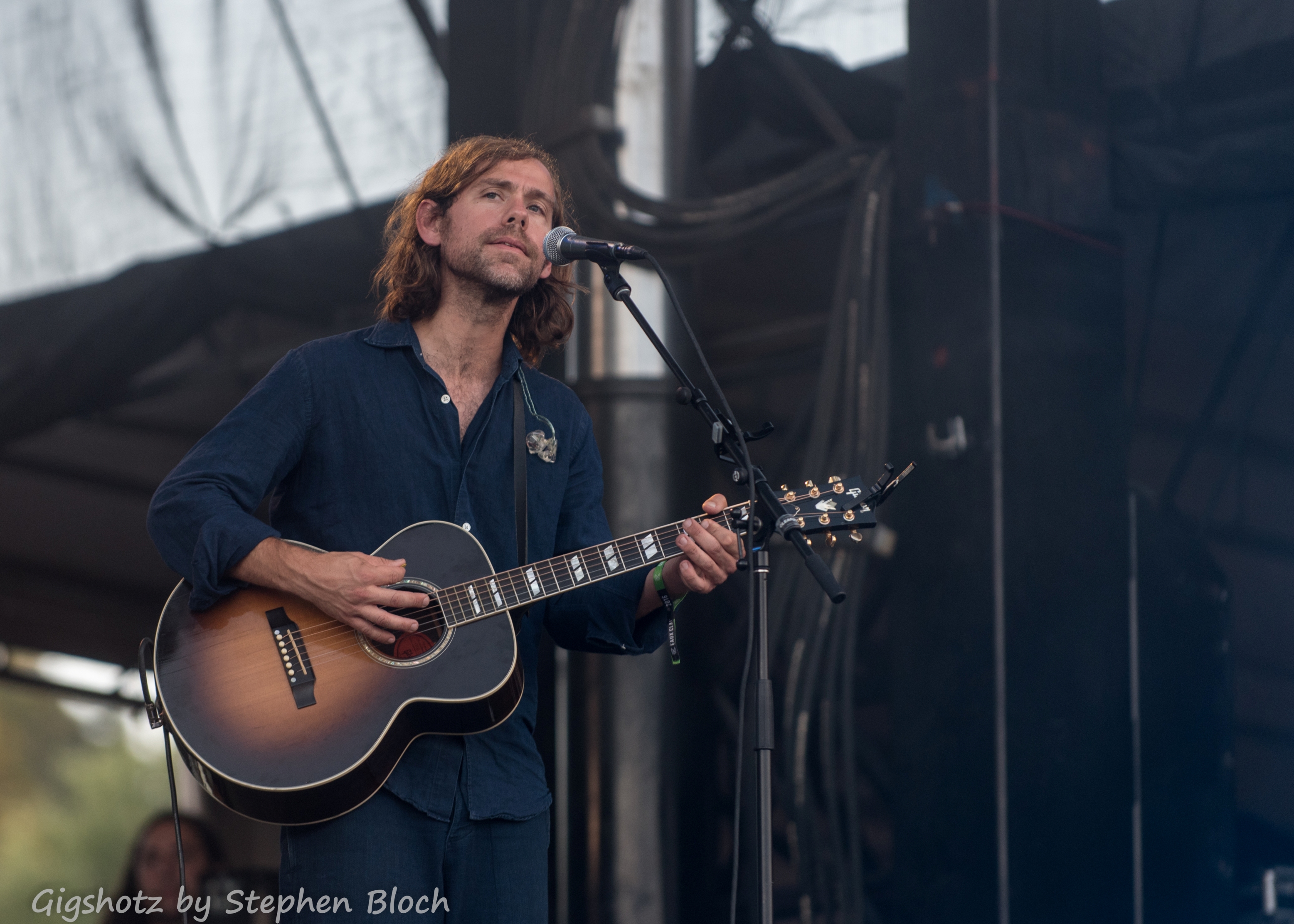The National: Life After Dead

When Matt Berninger was still an unknown twenty-something floating in the New York dot-com bubble, he used to walk along East Houston Street from his office in the Puck Building to the Mercury Lounge and see what the cool kids were up to. It was the late-‘90s and, once again, both New York City and its patented garage-rock sound had returned from the great beyond, only to be reclaimed by a new generation that would, in turn, eventually leave it all behind for the next class to find.
Matt, along with the rest of his future National bandmates, came of age in Cincinnati at a time when Ohio acts like Guided by Voices and The Afghan Whigs were redefining alt-rock ambitions in the MTV ‘80s. He had some local success with his own lo-fi band in college and, upon arriving in the Big Apple, he’d check out seminal early shows by highly stylized guitar-rock groups like The Strokes and Interpol. But, even though he didn’t really have a band, he knew he was capable of making something more long-lasting.
“We already had a bit of a chip on our shoulders, as far as what music was, when that whole Lower East Side explosion was happening,” he says almost 20 years later, as he prepares to roll out The National’s seventh full-length LP, and first after an uncharacteristic four-year pause, Sleep Well Beast. “We’d already been on the outside of a hipster scene once, and then we moved to Brooklyn and that put us in a package. So we went from being a Cincinnati band to being a Lower East Side band to being a Brooklyn band, and now I don’t know what we are.” He pauses, reconsiders his band’s status as citizens of the world and laughs. “We’re a French band. We’re the next Phoenix.”
It’s a misty Friday morning in mid-July, and the singer and his bandmates—bassist Scott Devendorf, Scott’s drummer brother Bryan and twin guitarists-cum-multi-instrumentalists/producers Aaron and Bryce Dessner—have convened in Hudson, N.Y., to kick off the Sleep Well Beast-era of their career with an immersive, multi-day “Guilty Party” gathering at Basilica Hudson (a former 19th-century factory that’s now a non-profit performance and exhibition space). During the weekend, The National will play all the tracks off their forthcoming record—including several debuts—in front of an intimate audience of friends, family and fast-fingered ticket buyers. A number of the musicians who appear on the record—Mouse on Mars, Sō Percussion, Nadia Sirota, Buke and Gase—are on hand as well, and will open for the group and perform throughout their set while tucked away in the venue’s four corners. Fans who wander around The National’s circular stage will have the unique opportunity to zoom in on their contributions, depending on where they choose to stand.
The National have long outlasted most of the bands that Matt watched explode into the blogosphere, either in terms of consistent output or overarching cultural impact, yet the group’s New York genesis has been on his mind recently. His early strolls across the gentrifying Bowery section of Manhattan are documented throughout Lizzy Goodman’s new oral history of New York during the decade after 9/11, Meet Me in the Bathroom. And Sleep Well Beast is The National’s first album to truly dig into the band’s own story and tropes with a removed perspective. On “Born to Beg,” Matt offers an epitaph for the scene that nurtured him: “New York is older/ And changing its skin again/ It dies every 10 years/ And then it begins again/ If your heart was in it/ I’d stay a minute.”
At the moment, though, The National and their entourage have taken over a small downtown inn for a day of meetings and interviews (as well as an informal happy hour). The members of the band are interviewed in small groups; Aaron and Bryce are currently paired in the lobby while Matt and the Devendorfs are holding court in the bar space. All five musicians appear far more relaxed than usual, a result of both their success over the years and their recent time in the Grateful Dead’s orbit—in particular, Matt, who sucks a vape pen as he talks, and Aaron have adopted a more casual look over the years and grown out their hair.
These days, it takes quite a bit of coordination to even get the entire band in the same building: Matt currently lives in Venice Beach, Calif., Bryan has returned home to Cincinnati, Scott resides in Long Island, N.Y., and Bryce has homes in Paris and the Catskills. Aaron’s set up shop in Hudson, which has grown into the band’s de facto Big Pink-like home base, but has spent a good chunk of time recently with his wife’s family in Denmark. The National’s diaspora started before the group released their previous album, 2013’s Trouble Will Find Me, but Sleep Well Beast is the quintet’s first record to truly absorb the sounds of those varied zip codes. And, for the first time, a minimalist European undercurrent guides The National’s homegrown Midwest-meets-New York post-punk/classic-rock mélange.
“[In Europe], they have a very different approach to money and success—there’s an endless rat race in America,” says Bryce. “There’s a word in French, métier, which means, ‘what you do.’ It’s why Americans find French waiters rude. Their job is not necessarily to serve you; their job is more the ritual of just making things. The musicians I know there are really talented, but they don’t necessarily have the success of our American peers. And, politically, in France—I’ve lived there through all the terrorist attacks, and then them electing an actually intelligent human being as president, compared to what’s happened here.”

If Trouble Will Find Me was the culmination of the classic National sound that they’ve honed since 2005’s Alligator, and was responsible for finally moving the group into select arenas and sheds stateside, then Sleep Well Beast is the start of their next phase. The ensemble’s trademark, winedrunk lyrics, lush, orchestrated soundscapes and clever indierock hooks remain, but the entire record moves with a new, German-electronic pulse, courtesy of the Dessners’ recent time abroad.
The National’s music has always felt like the soundtrack to an elegant affair with a slightly devious undercurrent— Sleep Well Beast plays out like the score for that evening soirée if it were still simmering at sunrise the next morning.
“Trouble Will Find Me had these classic National songs,” Aaron says. “They’re very well written and conceived. I see quite a different feeling in this record. There’s a lot more openness and possibility and space in the music. It’s less about good songwriting than it is about being a band.”
“We exist between the Grateful Dead and the Velvet Underground,” Bryce adds. “We’re equally borne of the DNA of punk-rock and psychedelic, spacey improvisation. In different camps of the band, those two things may resonate deeper. But they translated, this time, in some interesting ways. Maybe there’s a uniqueness about the Dead’s language, and somehow we’d gone out the other side.”
Aaron commenced work on Sleep Well Beast while The National were still touring behind Trouble Will Find Me. During the winter of 2014-15, Bryce joined him to “mindmeld” at a country church near his home and, by that April, the entire band had gathered for the first time to start sorting through those ideas. The group carved out a few additional working trips in New York, Los Angeles and elsewhere; they worked on the set’s lead single, “The System Only Dreams in Total Darkness” during some stoned sessions at Matt’s house. For the first time, the ensemble even tried some full-band writing sessions, though “Day I Die” was the only keeper.
In April of 2016, the twins celebrated their 40th birthday and, the next day, recording officially commenced at Aaron’s new studio. The proceedings were intentionally loose, and the band members spent a lot of their downtime just reconnecting and relaxing by an adjacent pond. “It was like summer camp,” admits Bryan. “But we actually made the record somehow—I’m not sure how it happened. There were intense, disciplined periods and some free-floating elements.”
“We didn’t feel any pressure,” Aaron says. “That was healthy because there was a lot of learning and growing going on. And at some point, when I decided to build the studio, there started to be a little bit more of a timeframe.”
The members of The National have long busied themselves with a variety of side-projects and parallel endeavors but, more than ever, the quintet started to feel like a collective. Matt formed the electro-indie outfit EL VY; Bryan and Scott devoted their attention to their improvrooted group LNZNDRF; Bryce, who is classically trained, composed a variety of new pieces, dipped his toes into writing for the ballet world and then participated in the space-age Planetarium project along with Sufjan Stevens, Nico Muhly and James McAlister; and Aaron continued to make his name as an in-demand producer for indie acts like Frightened Rabbit, The Lone Bellow and Local Natives.
“We were giving ourselves more time and better conditions,” Bryce adds. “We weren’t planning to make a record, and Matt was in a different headspace with EL VY, but we quickly realized that this was going a little better than usual. The music we were making started to gather momentum and then eventually [Matt] got interested in it, and started singing over things.”
In addition to various festival curations, studio collaborations and a film score with his brother, Aaron devoted much of his time to crafting the nearly six-hour indie-jam Grateful Dead tribute, Day of the Dead, which featured hefty contributions from Bryce and the Devendorfs, as well as The National proper on a few tracks. Then, Aaron, Scott and Bryan spent time on the road with Bob Weir as part of his Campfire Tour.
Though Sleep Well Beast strays from extended jams— and the album’s guitar solos are more angular Ira Kaplan (of Yo La Tengo) than journeyman Jerry Garcia—the band’s deepdive into the Dead’s catalog left an indelible mark on how The National approached their recording process and the resulting music. “The songs were a bit more open-ended. We created a lot of space for more possibilities and experimentation, as opposed to tightly organizing everything around what Matt was going to do, as far as trying to create the perfect song,” Aaron says. “It was more about creating these experiences. We designed the studio to be open and collaborative, where everyone could be set up in their own zone, fully plugged-in and experiment for eight hours thinking, ‘We’ll sort through it later.’”

For most of their rise, The National’s painstaking creative process involved Aaron crafting instrumental passages, often with Bryce, which Matt would write lyrics to. The tension between their varied approaches and the group’s overall multilevel family dynamic had a huge impact on the band’s sound. But, the free-form Sleep Well Beast sessions allowed the Dessners to reconsider just what constitutes a National song and to reach out to their extended network of friends like Justin Vernon, Josh Kaufman, Thomas Bartlett and Lisa Hannigan in order to flesh out their thoughts.
Some songs stemmed from ideas the Dessners had earmarked from other projects: The album’s title track was actually written as a piece for sisters Marielle and Katia Labèque, two pianists from Europe, before they reworked it for the band.
“It’s fun to not put too much pressure on what is a National song and what is not a National song,” Aaron says, before Bryce chimes in with a bit of his trademark sibling telepathy. “People ask us, ‘How do you do so many different things?’ And we don’t understand what other people do because the way we keep it interesting is by constantly learning. With Mouse on Mars, when we were over in Berlin, that was a whole new relationship with this record. We’re constantly collecting ideas that become part of the bigger musical landscape of what a National record can be.”
The album’s invocation, “Nobody Else Will Be There,” ushers in the band’s new, calm era when Matt croons, “It’s getting cold again but New York’s gorgeous/ It’s a subway day.” It’s a short stanza in the midst of a very National account of a packed party and evening-length goodbyes set over some cinematic piano and a sparse, consistent beat, but it perfectly captures the album’s seasonal mood—the rare New York moment between the increasingly brutal summer and winter months, when the city seems to stand still and exist in the now while welcoming in the next season.
It’s another approach they learned while working on Day of the Dead. “You can hear it; there’s air,” Aaron adds. “The conversation in the music is audible. As opposed to, in the past, where it’s been heavily layered in this beautiful, quilting, thick way. There are whole stretches of songs that have no guitar on this record. But there’s a greater sense of architecture in the music, which I think is something we’ve been trying to do for years.”
Scott has another explanation for the new approach: “Bryce was like, ‘I don’t want to play guitar anymore’ and, honestly, there was burnout,” he says of the band’s decision to bring in new computerized effects and to rely more heavily on keyboards, pianos, drum loops and enveloping string instruments. “Walk It Back” has a steady Krautrock-groove while the kaleidoscopic, New Wave hymn “I’ll Still Destroy You” is the rare National tune that contains some glitch.
In fact, the LP is loaded with fresh, post-indie-rock sounds. Aaron and Bryce note that they designed the guitar parts on “Guilty Party” to chirp like harps.
However, when the Dessners do plug in, they shred more than ever. On previous records, The National have largely avoided the extended guitar solos and classic-rock licks that defined their youth playing Dead and Allman Brothers tunes, but they channeled their inner Nels Cline on “Turtleneck,” as well as the breakdown of “The System Only Dreams in Total Darkness.” Matt—the only member of the band who didn’t go through a jamband phase growing up—even boasts that, at one point, he “directed” the Dessners’ dueling guitar solos. While working on Sleep Well Beast, the Dessners made time to record a slew of guitar solos as an exercise. “Nothing from that period survived or made it to this record, but I think it’s all strong,” Aaron says. “And we realized that we were just enjoying hearing an individual character. We had names for things, like ‘Razor Lemon,’ because of the guitar Bryce was playing and the way he was playing. It opened this door; it was like a fresh wind that was blowing all of a sudden.”
Aaron considers “Sleep Well Beast” the track most indebted to his time at Dead camp and can see it morphing on tour under those hot stage lights. “It has an incredibly simple, repetitive figure on piano,” he notes. “It’s open; you could play it many ways. The solo was just impulsively done in the studio one day while having a beer, but when we perform the song, it might sound very different each time. There’s a lot of freedom to it. And everyone got to experiment on that song. We used these French musicians— Bryce orchestrated across the top and Bryan played all this percussion.”

During their formative years, the lanky Matt was known as one of indie-rock’s most anxious frontmen, often calming his nerves by crouching over onstage and chugging wine. But success has allowed him to relax and even enjoy performing live. (His decision to use a teleprompter has helped, too.) “It was having a kid—that puts things into perspective,” he says. “It made us respect the band, meaning like, ‘Holy, shit. We all have families and we all can keep the lights on and put our kids through school, so we can’t fuck this up.’ But also, if it did get fucked up, who cares? Because that’s rock-and-roll.”
“The Dead are able to make difficult, complex music that doesn’t sound difficult,” Scott adds. “The exercise of learning their music was good for us because, in certain ways, our music is simpler than the Dead’s. There isn’t that turnaround.”
“Nothing lasts, and everything is forgotten,” Bryan adds with a sense of Zen-like wisdom. “What matters is the stuff that’s really important—don’t fuck up your marriage. Bob [Weir]’s spent more time onstage probably than I’ve been alive, and he leads by example—there’s no reason to feel anxiety about being watched. The anxiety should be more of a positive anxiety, like focusing on what’s happening in the moment.”
He sits back in his chair and smiles, adding, “Bob doesn’t like it when things speed up, so he always says that if you’re ever feeling that, just stop and breathe. And, honestly, sometimes I’ll be up on the stage and take a deep breath and not even think. It totally works, and I just enjoy the whole freedom to do whatever I want. We’ve played a lot of shows, but a lot of times, we’re trying to recreate something, rather than create something. And Bob is like, ‘They’ve heard the record. Let’s play it this way.’”
“Trouble Will Find Me was the first record that we really enjoyed making—it was never anxiety-ridden, like, ‘Oh, we’re going to fail,’” Aaron says. “And then, this time, we just felt liberated. Making this insane Grateful Dead tribute, you just realize the different periods of the Dead and how much freedom they had, with experimentalism at the core of it— and also, playing with Bob Weir, where nothing is ever the same. So, it was a little more haphazard. It was totally OK for me to make an entirely electronic demo in my hotel room and send it to Matt or Bryce to mess with.”
The more chilled-out Devendorfs ran with that feeling too. Instead of always worrying about sticking to tightly woven arrangements, Bryan would often improvise in the studio. Matt is even more candid about their new approach: “It was a lot of new toys, but it was also realizing that it was so unclear to us, anyway, what our sound was or what our signature was or what our wheelhouse was. And none of us would agree on it anyway. So then it was like, ‘Why not add more colors to the swirl and see what that looks like?’”
“Not having a deadline really alleviated a lot of pressure for me, personally, and for Aaron, too,” Bryan says. “Most of our records have come in a creatively contentious way. [This time], we haven’t been fighting or nervous about our careers or striking while the iron is hot. All that shit used to add unnecessary stress; it was hard. So, on the last two records, we just said, ‘Fuck it. Someday, maybe we’ll put out another record.’ That has been the healthiest, most creative catalyst for us. In the past, we’ve gotten into all of these corners over totally unnecessary choices that didn’t need to be made. And so, we got ourselves out of those corners.”
Lyrically, Matt, who is aware that he now has an audio scrapbook of his life and relationship woes, spends much of the new record diving into his own midlife questions—from losing parents to the need to ghost instead of engaging in a long conversation. His wife Carin—a former New Yorker editor—has served as his muse and occasional writing accomplice for years. (He’s often used the character Karen as her lyrical stand-in in songs.) On Sleep Well Beast, she takes on an even bigger role, co-writing all the album’s lyrics and working through their own marriage issues in public on “Carin at the Liquor Store,” which recounts the unraveling of a fictional relationship. Instead of his trademark screams and sermons, Matt’s voice has also aged into more of a midrange, expressive instrument.
Aaron sees his new studio as a key part of The National’s future. In addition to working with the band and recording other acts, he hopes to use the sanctuarylike building as his sonic laboratory. “We fell in love with these churches while working on Day of the Dead because of how the rooms sound,” he says. “So, we built [our studio] with the dimensions of a small church. That was an important influence, as far as getting out of the garage and wanting a space where we could actually play comfortably together.”
He thinks back to the band’s early days recording in Brooklyn. “We made Alligator in my sister’s attic and Boxer in my attic—these tiny spaces, where we would record the guitars in the closet. Now, we finally have a place that’s ideal for how The National needs to work. It sounds simple, but we actually never had that.” (Matt, Scott and Bryan all agree that Aaron may, ultimately, have some Levon Helm-like aspirations for his new audio playground.)
Perhaps because they have seen so many musical scenes come and go, the members of The National are still a nostalgic bunch. Before Trouble Will Find Me, they returned to Mercury Lounge— where talent buyer/booker Johnny Beach provided them with their first big break after blindly listening to their CD—for an underplay. This time, they packed into the venue’s sister club, The Bowery Ballroom, for the first time in a decade.
And, Matt knows that sometimes the bands that last the longest change the most over time.
“It’s like the Bee Gees—they started as one kind of band, and then they became uncool,” he says. “And then, because someone asked them to write some songs for a disco movie, they redefined their whole musical idea. So, we’re the Bee Gees of depressing music— without the disco.”




















